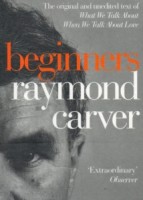categories
- Traffic and Vehicles Catalogue
- socreal.catalog
- Advertisement Catalogue
- Photo Catalogue
- Chinese and Japanese Catalogue
- New Holy Card Catalogue II.
- 12 interesting old books
 Books
Books
 Bibliophil
Bibliophil
 Antiques
Antiques
 Engraving
Engraving
 Maps
Maps
 Photos
Photos
 Antique Papers, Small Prints
Antique Papers, Small Prints
 Posters
Posters
- Circus
- Modern Graphics
- Socialist Realism
- NER Propaganda
- Others
cart
Cart is empty
You've not logged in
Carver, Raymond : Beginners
- description
- additional information
The Original Version of What We Talk About When We Talk About Love
Every artist should be required to compare the manuscript Raymond Carver submitted to his editor Gordon Lish, Beginners, with the version Lish eventually published as What We Talk About When We Talk About Love (which I will refer to below as WWTA). Lish’s version won critical acclaim, secured Carver’s place in the literary canon, and helped revitalize the art of short fiction in the 1980s. But the published manuscript was far different from Carver’s original vision. Comparing the stories side-by-side gives rise to interesting and difficult questions about the creative process. Why do writers write? Editors edit? And do readers even care? The recently published Library of America collection of Carver’s work, Collected Stories, gathers multiple drafts of the authors’ more memorable stories together, including the full manuscripts of Beginners and WWTA. In his early days, Carver’s work was dark, depressing, even murderous at times. Babies are killed by squabbling parents, men murder their wives and sisters, alcoholism runs rampant, and infidelity offers more intimacy than the brutality of the marriages described here. Carver was a practicing alcoholic in the late 1960s and 1970s, and the tales he wrote during this time reflect the hopelessness and despair which drove him to drink.
Every artist should be required to compare the manuscript Raymond Carver submitted to his editor Gordon Lish, Beginners, with the version Lish eventually published as What We Talk About When We Talk About Love (which I will refer to below as WWTA). Lish’s version won critical acclaim, secured Carver’s place in the literary canon, and helped revitalize the art of short fiction in the 1980s. But the published manuscript was far different from Carver’s original vision. Comparing the stories side-by-side gives rise to interesting and difficult questions about the creative process. Why do writers write? Editors edit? And do readers even care? The recently published Library of America collection of Carver’s work, Collected Stories, gathers multiple drafts of the authors’ more memorable stories together, including the full manuscripts of Beginners and WWTA. In his early days, Carver’s work was dark, depressing, even murderous at times. Babies are killed by squabbling parents, men murder their wives and sisters, alcoholism runs rampant, and infidelity offers more intimacy than the brutality of the marriages described here. Carver was a practicing alcoholic in the late 1960s and 1970s, and the tales he wrote during this time reflect the hopelessness and despair which drove him to drink.
| condition: |      |
| category: | Books > Foreign Language Books > Books in English > Literature in English > |
| category: | Books > Literature > Novel > |
| publisher: | Vintage Books, 2010 |
| item number / ISBN: | 9780099540328 |
| binding: | paperback |
| pages: | 212 |
| language: | English |

















 Telefon:
Telefon: E-mail:
E-mail:







